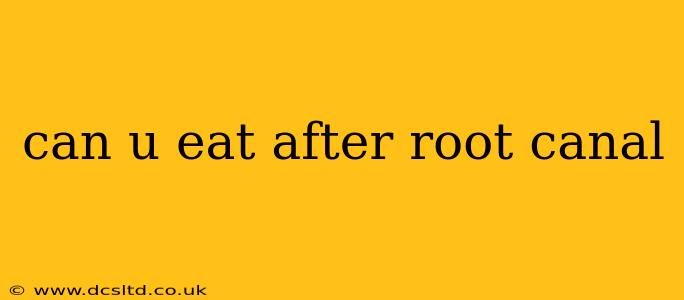Getting a root canal can be a nerve-wracking experience, and many patients wonder about the post-procedure recovery, especially regarding eating. The short answer is yes, you can eat after a root canal, but it's crucial to do so carefully and strategically to ensure proper healing. This guide will explore the specifics, answering your most pressing questions about eating after this common dental procedure.
What to Expect Immediately After a Root Canal
Following a root canal, you'll likely experience some level of discomfort and sensitivity in the treated tooth. The numbness from the local anesthetic will wear off gradually, revealing any lingering soreness. Your dentist will likely provide pain relief medication, and following their instructions meticulously is key to a smooth recovery.
Initially, it’s best to stick to soft foods. Avoid anything that requires excessive chewing or could put pressure on the treated tooth. Think along the lines of yogurt, applesauce, mashed potatoes, or broth-based soups.
What Can You Eat After the Initial Numbness Wears Off?
Once the anesthetic wears off and you're feeling more comfortable, you can gradually introduce more foods into your diet. However, there are still some things to keep in mind:
- Avoid extremely hot or cold foods and drinks: Temperature sensitivity is common after a root canal. Gradually introduce warmer or cooler foods to see how your tooth reacts.
- Chew on the opposite side: For the first few days, try to chew your food primarily on the side of your mouth opposite the treated tooth. This reduces pressure and stress on the healing area.
- Choose softer foods: Even after a few days, it's wise to continue favoring softer foods. This minimizes the risk of irritating the treated area. Think well-cooked vegetables, pasta, and fish.
- Cut food into smaller pieces: This makes chewing easier and less strenuous.
What Foods Should You Avoid After a Root Canal?
Some foods are best avoided in the days and weeks following a root canal to prevent discomfort and potential complications. These include:
- Hard, crunchy foods: These can damage the temporary filling or irritate the sensitive tooth. Examples include nuts, hard candies, popcorn, and ice.
- Sticky foods: These can cling to the tooth and make cleaning difficult, potentially increasing the risk of infection. Avoid caramel, toffee, and gummy candies.
- Foods that require excessive chewing: Tough meats, raw vegetables, and other foods that require a lot of chewing can put too much pressure on the treated area.
Can You Eat Immediately After the Root Canal Procedure?
While you might feel a bit numb and disoriented immediately after the procedure, you can generally have something light to eat. However, it’s very important that you wait until the numbness has completely worn off before consuming anything more substantial. This prevents accidental biting or chewing on your lip or tongue, as well as protects the delicate post-procedure area.
How Long Should You Wait Before Eating Normal Foods?
There's no strict timeframe, but many dentists recommend sticking to a soft food diet for at least a few days. You can progressively introduce firmer foods as your comfort level increases. If you experience any pain or discomfort, revert back to softer foods for a while. Always follow your dentist's specific post-operative instructions.
What if I Experience Pain or Discomfort While Eating?
If you feel any significant pain or discomfort while eating, stop immediately. You should contact your dentist to discuss your symptoms. Pain could indicate an issue with the procedure or an infection, requiring prompt attention.
Conclusion
Eating after a root canal is manageable, provided you follow your dentist's instructions and exercise caution. By prioritizing soft foods initially and gradually reintroducing firmer options, you can minimize discomfort and promote proper healing. Remember, patience and careful consideration of your dietary choices during this recovery phase can significantly improve your overall experience. Always consult your dentist if you have any concerns or experience unexpected symptoms.
